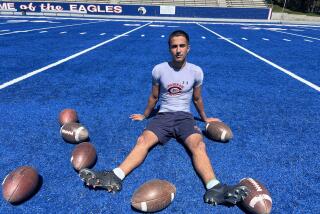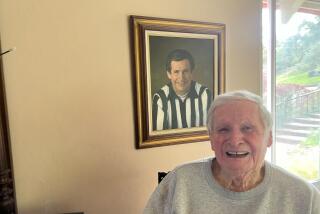Canton is boom town for a day as punter Ray Guy enters Hall of Fame
Ray Guy had a thundering leg, sure, but did he really have the power to punt a football from one end zone to the other?
John Madden didn’t buy it.
“When we scouted him I saw a film that he kicked the ball 100 yards,” recalled Madden, coach of the Oakland Raiders at the time. “He kicked it out of his own end zone into the other team’s end zone. I said, that’s the definition of a guy that could really flip field position. And I looked at the film so many times and I thought it was trick photography. In those days it was real film, and we had a splice an editor could make himself.”
Madden painstakingly went through the reel frame by frame.
“I thought it had to be two punts,” he said. “I looked and looked, then realized it was real. Then when we were getting ready for that draft, I looked at that tape every day and thought what he could do for our team.”
Guy will enter the Pro Football Hall of Fame on Saturday — the first true punter to earn that prestigious honor — and Madden will introduce him, putting the finishing touches on a slow-motion pilgrimage to Canton, Ohio, that took more than 20 years. Guy, who spent his entire career with the Raiders, from 1973 through ‘86, was a Hall of Fame finalist seven times since 1992 before finally getting in as a seniors’ nominee. He joins placekicker Jan Stenerud as the only true kickers enshrined.
As happy as he is that he’s gotten to Canton at last, Guy is disappointed that some of the people who meant the most to him are gone.
“There are certain people in my life that were very influential on me. My high school coach isn’t going to be there, my college coach won’t be there, of course [late Raiders owner] Al Davis won’t be there, Mom and Dad are gone,” he said. “So there are things that matter that are going to be very emotional.”
Guy, an angular 6 feet 3, became the only punter selected in the first round when the Raiders made him the 23rd overall pick in 1973. He had been an all-conference safety at Southern Mississippi in addition to his punting, and he thought he might get a chance to play defense in the pros. No such luck.
“The first day of padded practice, after I’d watched him punt, everyone was ooo-ing and ahhh-ing and wow-ing,” said Madden, calling from his “Madden Cruiser” bus this week on his way to Canton. “So we’re out there and we switch to defense. Ray Guy goes out there and lines up at strong safety.”
Unwilling to put his prized punter in harm’s way, Madden kicked him off the field.
“He was kind of in shock,” the Hall of Fame coach recalled. “But he’s a real gentleman, a real good kid, so he just walked off. After practice he said, ‘Coach, when [general manager] Ron Wolf signed me, he said that I could play safety too.’ I didn’t want to get into this being a long-term thing. So I just said, ‘Ron Wolf lied.’
“It wasn’t going to be one of those things where I said, ‘Wait till we get started,’ or, ‘Next week,’ or, ‘Let’s get through this year and we’ll do it next year.’ I was going to end it right then. That was the end of it. Never went out there again. Never asked about it again.”
Not that the adjustment was all that easy.
“When you’re doing so many things [in college] and contributing in so many areas, and then all of a sudden your life starts out where you’re only focusing on one thing, it’s tough to get it out of your system, because your body is so geared, your mind is geared to doing everything,” Guy said in his pronounced Southern drawl. “That was probably one of the hardest things that I had to face the first couple years, is to get that mentality of being a starting safety and hitting people out of my mind and then focusing on one thing as being a punter.”
So towering were Guy’s punts that one of them plunked the New Orleans Superdome scoreboard, suspended 90 feet above the field. The whole concept of using a stopwatch to measure “hang time” began with the Raiders timing Guy’s punts to make sure they had a coverage team that was fast enough to get downfield and make plays.
“He would kick it so high and so long, and all the pundits would be around saying he’s going to out-kick his coverage,” Madden said. “That’s when I said, ‘Let’s time how long it is, so we can time how fast the guys have to be to get down there. Because I’m not going to get rid of Ray Guy. If we have trouble out-kicking the coverage, I’m going to get some new coverage guys.’”
Compared to today’s punters, Guy’s numbers are not staggering. His career average of 42.4 yards per punt ranks him 61st in NFL history. But he arrived at a time when punting was almost an afterthought, a task usually performed by a player who wore many hats.
“Any time he got back there for a punt, fans watched like they were watching the ball on the two-yard line with the game on the line. They knew he was going to do something special,” said Willie Brown, a Hall of Fame Raiders cornerback. “This guy was an athlete, not just a punter. He saved so many games for us. A third of this game is field position, and if the offense was backed up to the end zone, they didn’t worry about it.
“There were games when he was our best defensive player by far.”
Guy was so skilled and reliable, he changed the way the Raiders approached the game.
“You know all about the punts and the height and the leg and all that stuff,” Madden said. “But field position is so big. It gave our quarterbacks confidence. I used to tell them, look, on third down if you’ve got third and long and there’s nothing there, you don’t have to force anything because if we have an incomplete pass the worst thing we have to do is Ray Guy punts. And that’s not bad.”
Twitter: @LATimesfarmer
More to Read
Go beyond the scoreboard
Get the latest on L.A.'s teams in the daily Sports Report newsletter.
You may occasionally receive promotional content from the Los Angeles Times.











